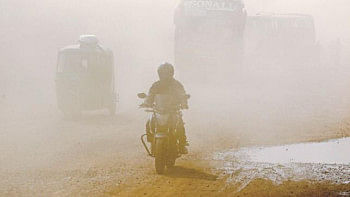Pollution
Dhaka’s air 4th most polluted in the world this morning
Dhaka's air continues to be 'unhealthy' as it ranked fourth on the list of cities worldwide with the worst air quality today
Dhaka’s air 2nd worst in the world this morning
Dhaka ranked second on the list of cities worldwide with the worst air quality this morning
No respite from air pollution during Eid holiday
Dhaka’s air quality 2nd worst in world today
Dhaka’s air quality 5th worst in the world this morning
Dhaka has ranked fifth on the list of cities worldwide with the worst air quality with an AQI index of 158 at 10:33am this morning
Dhaka's air unhealthy even on Eid day
Dhaka's air ranked as 7th most polluted among cities around the world this morning, according to Air Quality Index (AQI)
Dhaka’s air quality 3rd worst in the world this morning
Dhaka ranked third on the list of the cities worldwide with the worst air quality this morning
No improvement in Dhaka’s air quality, still ‘unhealthy’
Dhaka's air quality has been identified as "unhealthy" this morning
Dhaka’s air quality 4th worst in the world this morning
In the wake of the Eid-ul-Fitr celebrations, with a significant exodus of residents leaving the capital for festive reunions, Dhaka's air quality remains alarmingly poor
Bangladesh, Pakistan and India bottom in air quality rankings in 2023, data shows
Pakistan remained one of the world's three smoggiest countries in 2023, as Bangladesh and India replaced Chad and Iran, with particulate matter about 15 times the level recommended by the World Health Organization, data published on Tuesday showed
Dhaka's air quality 3rd worst in the world this morning
Dhaka has ranked third on the list of cities worldwide with the worst air quality with an AQI index of 197 at 9:00am this morning
Dhaka’s air quality 3rd worst in the world this morning
With an air quality index (AQI) score of 206 at 9:00am, Dhaka ranked third on the list of cities worldwide with the worst air quality
Dhaka’s air quality 5th worst in the world this morning
Dhaka's air quality was categorised as “very unhealthy" this morning. With an air quality index (AQI) score of 166 at 9:37 am, Dhaka ranked fifth on the list of cities worldwide with the worst air quality
Dhaka’s air quality 2nd worst in the world this morning
Dhaka ranked second on the list of cities worldwide with the worst air quality, with an AQI score of 195 at 9:10am, this morning
Dhaka’s air quality 5th worst in the world this morning
With an air quality index (AQI) score of 176 at 9:01 am, Dhaka ranked 5th on the list of cities worldwide with the worst air quality
Dhaka’s air ‘unhealthy’, 4th worst in the world
Dhaka ranked fourth on the list of cities worldwide with the worst air quality this morning
Plastic pollution choking Ctg canals
With most canals in Chattogram city choking on non-biodegradable plastic waste, waterlogging is likely to worsen in the coming monsoon, fear experts.
Dhaka’s air quality 4th worst in the world this morning
Dhaka has ranked fourth on the list of cities worldwide with the worst air quality with an AQI score of 181 at 9:06am this morning
Dhaka's air 3rd most polluted in the world this morning
Dhaka ranked third on the list of cities worldwide with the worst air quality this morning











